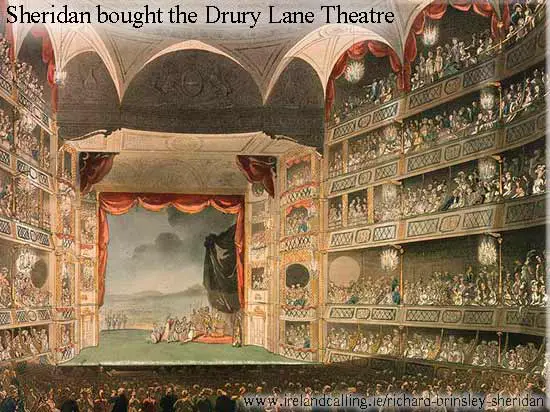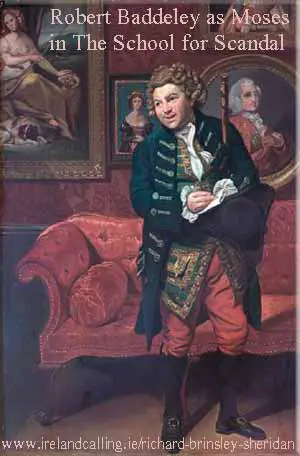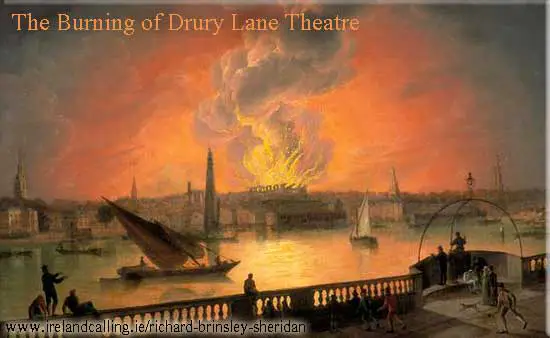Richard Brinsley Sheridan was a poet, theatre manager, playwright and politician.

He was one of Ireland’s most successful writers of the 19th century and many of his plays are still performed today.
For a time, Sheridan was one of the most in-demand men in London, mixing with the upper classes. He was also a member of the British parliament.
Sheridan was born in Dublin into a middle class family, his father was an actor and theatre manager and his mother was a writer.
The family moved to London when Sheridan was still young and he was educated at the prestigious Harrow School.
The first incident of note in Sheridan’s life came when he was in his early twenties in 1772. He challenged the writer Captain Thomas Matthews to a duel.
Matthews had insulted Elizabeth Ann Linley in a newspaper article. Sheridan intended to marry Linley and ordered the duel to defend her honour.

The duel was a major let down for fight fans. The two men initially met at Hyde Park in London but kept moving to try and find a less crowded place to do battle. In the end, the duel went ahead but was short and uneventful. Matthews lost his sword and was forced to ‘beg for his life’ according to Sheridan.
He was also forced to publicly apologise to Linley. Neither man was seriously injured in the duel.
The rematch was far more brutal. Matthews was furious at his public humiliation and challenged Sheridan to another duel. Sheridan did not have to agree, but would have lost face had he refused so the fight went ahead.
This time Sheridan was beaten half to death by Matthews, although he did some serious damage to his opponent too. Both men lost their swords and continued to fight with their bare hands, despite bleeding from open wounds all over their bodies.
Eventually Matthews fled the scene. Sheridan was in hospital for more than a week with his injuries before his condition was no longer considered life threatening.
He did make a full recovery and married Elizabeth Ann Linley a few months later. The newlyweds moved into a fashionable area of London and became popular amongst the city’s middle-to-upper classes.
Their ability to host a party coupled with their quick wit and charm proved to be an irresistible combination.
However, Sheridan and his wife were living beyond their means. They had no regular source of income and were living off the money Elizabeth had inherited from her father when she married. Sheridan had to find work in order to survive in London.
He wrote a play, The Rivals, to be performed in London’s West End. The actors were booed off stage on the opening night but Sheridan kept faith.

He replaced his leading man with a more competent actor and the show’s second night was a roaring success.
He collaborated with his father-in-law to create an opera called The Duenna which was so popular it played for 75 nights. Sheridan was now living in fashionable London and the hottest young writer in the city.
Sheridan took advantage of his position as one of the in-demand men in London. He used his sudden fortune to purchase the Drury Lane Theatre.

Sheridan was now able to write and produce his own plays, and get paid almost all the money from the ticket sales. The School for Scandal, The Critic and The Rehearsal were all successful plays produced by Sheridan during this time. Most of his plays would be categorised in the comedy of manners genre.

He also entered politics in 1780, allegedly paying officials in order to take his seat in the House of Commons. His first speech was one to defend himself against a criminal charge of bribery, which he managed to do.
Sheridan was a charismatic speaker and popular amongst his peers. He gave a speech demanding the impeachment of the first Governor of India, Warren Hastings, who was accused of corruption. Edmund Burke (another famous Irish politician and writer) described Sheridan’s speech as “the greatest ever delivered in ancient or modern times”.
However, Sheridan sometimes failed to take his position in parliament or his colleagues seriously. In 1793 Edmund Burke was debating the Aliens Act, which was designed to prevent French revolutionary spies from entering Britain.
Burke was trying to make the point that they would be willing to use violence against the authorities and the threat was very real.
He threw a knife down to illustrate his point and it stuck in the floor. Several MPs were shocked by the dramatic act, but Sheridan simply piped up: “Where’s the fork?” which broke the tension and left the politicians in fits of hysterics. It also completely took the attention away from Burke’s point.

In 1809 Sheridan’s life took a turn for the worse. Disaster struck when his theatre caught fire and burnt down.

He was reportedly seen standing by the roadside sipping a glass of wine as he watched his theatre, which had brought him so much success and riches, burning to the ground. He was calm and sombre with his only comment being: “A man may surely be allowed to take a glass of wine by his own fireside.”
A couple of years later he lost his seat in parliament and was suddenly in financial trouble. He had lost his wage as a politician and also his theatre. He was offered £20,000 by the American Congress who were grateful to him for his previous work in trying to prevent the American Civil War. Sheridan declined the offer. The rest of his life was lived in poverty as he struggled with his debts.
He died in his bed at home and was buried in Poets Corner of Westminster Abbey. His funeral was attended by numerous MPs, actors and members of the British nobility including the Mayor of London.

Richard Brinsley Sheridan quotes
More popular articles and videos
The real life mystery of what Maureen O’Hara whispered to make John Wayne look so shocked
Matt Damon winning hearts and minds with charm assault on Ireland
Action hero Tom Cruise was once attacked by an old man in a Kerry pub
Liam Neeson speaks about his late wife in emotional interview
Dating site explains why Irish men make wonderful husband material
Billy Connolly says public should ignore politicians and listen to comedians
Take a look inside Hollywood star Saoirse Ronan’s stunning Irish home
